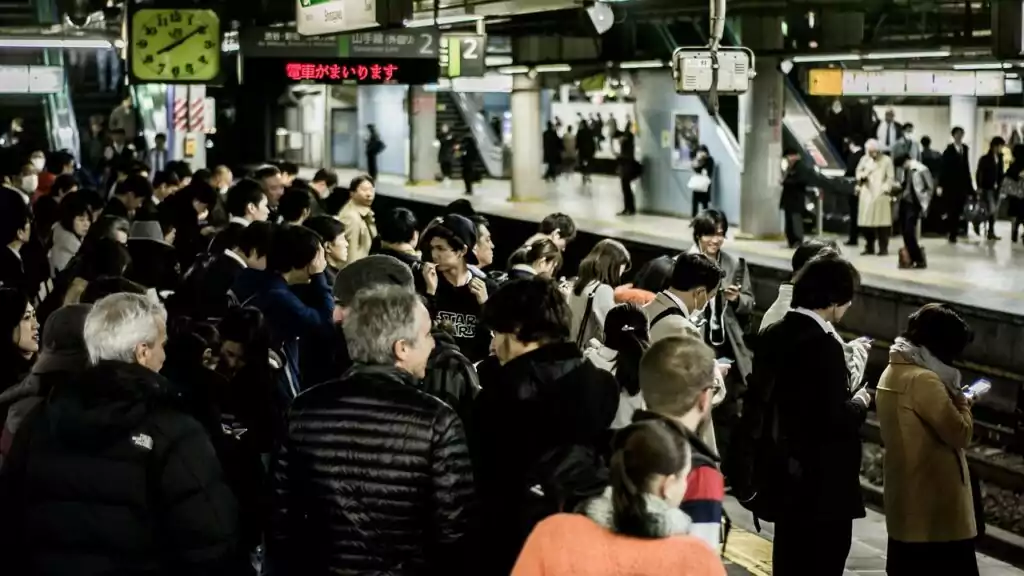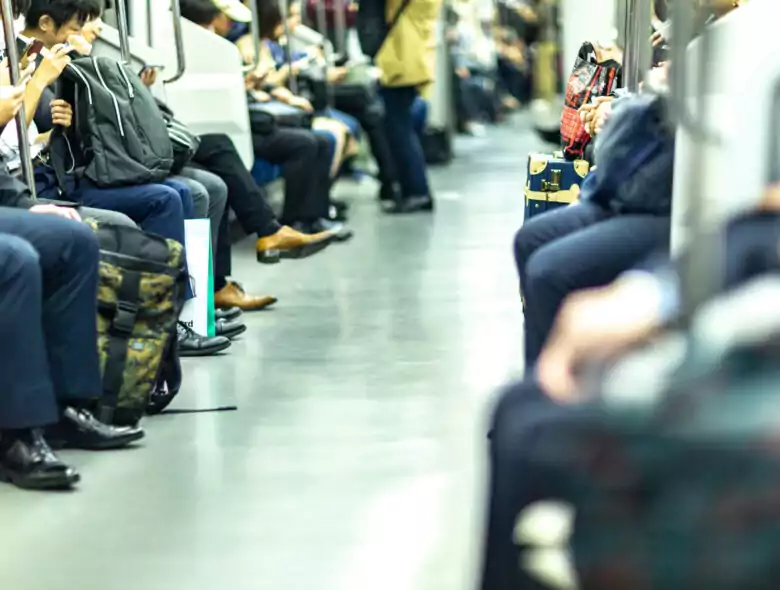According to data from the United Nations, as of September 9th, 2023, Japan’s population currently sits at 123,67,005. This puts the population density in the country at 338 individuals per km ².
93.5% of Japan’s population is urban, meaning they are concentrated in cities such as Tokyo and Osaka. As of 2023, 115,292,289 individuals live in city areas. Tokyo, Japan’s capital, is currently home to an estimated 35.8 million people in 2023 according to Japan Times. This makes Tokyo the densest and most populous city in the world
Japan’s rural population on the other hand is around 10,066,305 as of 2022, which is 1.52 % less compared to 2021. Looking at the past year’s data by macrotrneds.net, a decline at an even higher pace can be expected for the years to come.
Commuting in Japan

For those of working age in Japan, commuting is generally part and parcel of their daily routine.
Commuting is defined as, “making the same journey between work and home on a regular basis”; and individuals who commute on the daily are classified as commuters.
A 2015 survey conducted by NHK Culture Research Institute revealed that the average working individual in Japan spent an average of 1 hour and 19 minutes commuting back and forth from work – roughly 39.5 minutes each way. Unsurprisingly perhaps, working individuals in Tokyo had the longest commute of around 1 hour and 42 minutes; while those who lived in cities and towns with populations under 300,000 had an average commute time of 1 hour and 9 minutes.
When it comes to how working individuals commute in Japan, around 53% of students and 48% of workers commuted via train and/or subway while 13% of students and 9% of workers commuted via bus and/or street car.
In rural areas, however, cars are a more common method of transport used for commuting to school or work due to the limited and restricted public transport options available. It is estimated that 64% of working individuals in rural areas commuted to work by car versus 14% of working individuals in urban areas.
So, it has been established that commuting is commonplace in Japan for those working. However, how far is too far to commute? This article will attempt to compare the pros and cons of a long commute.
Commuting Can Be Tiring

Experts and psychologists agree that an average of 30 minutes one way is a reasonable commute that doesn’t put that much strain on the commuter, physiologically or psychologically. A 60-minute commute one way is considered too long, while 90 minutes and over is extreme and not recommended. The basic rule of thumb is that if the commute drastically interferes with your day-to-day life, sleep schedule, and your overall health – physical and mental – it’s not worth it.
If you live in the city and commute to work via public transport, you might be able to catch up on some sleep on the train or bus (if you’re able to grab a seat!); but if you are residing in the countryside and driving to work is your go-to mode of transportation, it may be wise to ensure that your commute it limited to an hour max both ways. Luckily, if you are looking for an apartment outside of urban areas, Village House has over 1,000 properties scattered across all of Japan’s 47 prefectures, and their helpful representatives and help narrow down an apartment that’s a reasonable distance from your place of work.
Arriving Late to Work

There is a credo that states, “On time is late” and Japan is a country that prides itself on punctuality. Arriving late to work, while not exactly illegal, is highly frowned upon and not to mention unprofessional. Thus, this should be taken into account when possibly choosing an apartment further away from your office.
If you reside in cities such as Tokyo and Osaka, you’ll be at the mercy of the train or bus schedules and will have to plan your commute accordingly. However, the advantage of using such modes of public transportation is that they are generally on time and frequent and they bypass the inevitable traffic jams that crowd the roads during rush hour.
On the other hand, if you reside in a more remote and rural area and commute to work via car, you’ll have the benefit of having more control over when you leave for work and fewer traffic jams. However, it always means that if you are late for work, there’ll be nobody to blame but yourself.
Apartment Options
Japan is notorious for having apartments the size of a glorified walk-in closet but this usually only applies to dense metropolitan areas such as the capital city. If you live in Japan’s inaka, Japanese for “countryside”, you’ll not only have more housing options to choose from but they tend to be cheaper and more spacious than their urban counterparts. Village House, a real estate organization, has numerous apartments to suit all budgets, with rent starting from as low as ¥20,000 and lower upfront costs.
If you’re in need of a spacious apartment and live in the city, a longer commute might be feasible if you manage to find a place near a bus stop or train station; and your commute does not involve multiple transfers. If you want a bigger apartment, live outside the city limits, and plan to commute to work by car, a longer commute may be more doable than if you lived in the city.
If you are lucky enough to be able to work remotely either full-time or part-time, then you either need not worry about the distance from your apartment to your place of work, or you might just be willing to commute that extra distance a few times a week. Prior to Covid, the number of working individuals who worked from home was around 10% but this number increased up to 27% during the pandemic. Now, many companies in Japan offer a sort of hybrid work schedule – remote work and office work. As of 2022, around 55.65 of Japanese workers were allowed such work schedules, which has opened more opportunities when it came to where they lived.
Dealing with Having to Work Overtime

Japan’s work culture is known to be harsh and unyielding, and one of the more unsavory aspects of working in Japan is the excessive amounts of overtime employees tend to put in. According to Nippon.com, a 2022 survey found that Japanese employees clocked an average of 22.2 hours of overtime, a 1.4-hour increase from 2021.
Bearing this in mind, a long commute will immediately become unattractive, especially if you end up getting home late and have to leave for work early the next day. Again, if you reside in the city, you may be able to catch up on some sleep if you commute via public transport but frequent overtime and driving a car tends to not be a good mix. Hence, if you live in rural areas and know that you’ll be doing lots of overtime, you may want to sacrifice more of your salary to rent if it means putting you closer to your place of work and shortening your commute time.
That being said, you may purposely want a long commute in order to avoid overtime and other work obligations such as nomikais and other after-work socialization.
Maintaining a Good Work-Life Balance

Business News Daily describes ‘work-life balance’ as “the state of equilibrium where a person equally prioritizes the demands of one’s career and the demands of one’s personal life”. Studies have indicated that long commutes end up having a detrimental effect on one’s job satisfaction and increases the risk of mental health issues in the long run, thus affecting one’s work-life balance.
Another thing to consider is whether or not a long commute will end up cutting into your socialization with others. If a commute to work and back often leaves you too exhausted to participate in social activities, hobbies, etc., then it may not be worth the effort. For those living in city areas and commuting via public transport, catching up on sleep during your commute may seem a viable solution in the short run but it still does not make up for a proper sleep schedule, which can lead to stress, anxiety, exhaustion, and eventually burnout.
For those residing in rural areas, it may already be harder to maintain an optimal work-life balance due to limited access to entertainment, events, and conveniences offered in cities. Thus, a long commute may not be efficient and the extra time you may allot to your commute may be better off spent on being with friends and coworkers or indulging in your hobbies.
Related articles:
- Have You Been Looking for an Apartment for Too Long already? 5 Tips to Help You Find Your Ideal Apartment Now!
- Is a 20-Minute Walk to the Station too Far? Find Out if an Apartment at a Farther Walking Distance is the Right Choice for You!
- Should You Avoid Rental Properties Along Train Tracks? Actually, they Come With Many Benefits!



